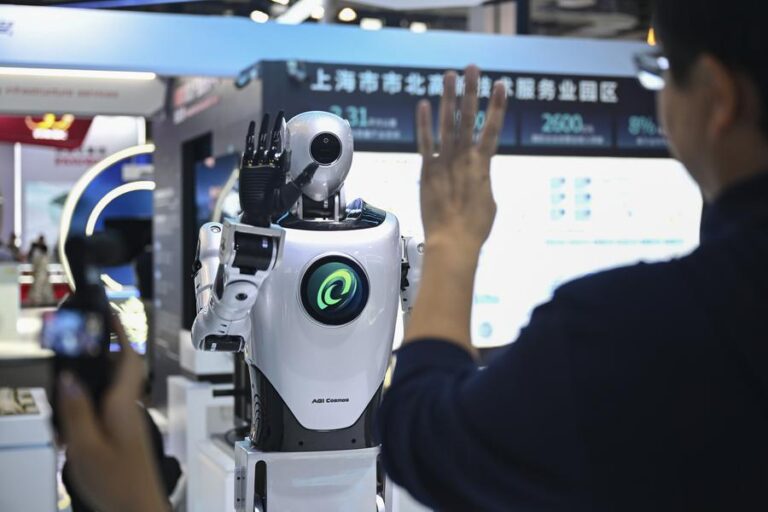China’s latest proposal is more than a call for cooperation — it is a strategic move to shape how AI is regulated, applied and understood globally.
by Maya Majueran
Building on President Xi Jinping’s 2023 proposal for the Global Artificial Intelligence (AI) Governance Initiative, the Chinese government has now called for the creation of a global AI cooperation organization.
In July, Chinese Premier Li Qiang announced the proposal during his address at the opening ceremony of the 2025 World AI Conference and High-Level Meeting on Global AI Governance, a three-day event held in Shanghai.
China’s call comes amid intensifying competition among major global countries at a time when efforts to regulate AI remain fragmented. Despite mounting geopolitical tensions, there is a shared international interest in addressing risks posed by AI, including machine hallucinations, deepfakes and unchecked proliferation.
An urgent need exists to build a consensus on how to strike a sustainable balance between technological advancement and security. As AI becomes embedded in every aspect of daily life, including public services, healthcare, finance and national defence, societies face the dual challenge of fostering innovation while managing complex risks.
Addressing these challenges requires inclusive dialogue among governments, industry leaders, researchers and civil society. The goal must be to ensure that AI develops responsibly, ethically and in alignment with the public interest and global stability. Much like the global financial architecture that has long been dominated by Western hegemony, there is increasing recognition that AI governance should follow a more multipolar trajectory. A balanced approach is crucial to prevent any single bloc from unilaterally shaping the future of this transformative technology.
China envisions the proposed organization as a comprehensive, inclusive platform for international AI cooperation. It aims to foster broad participation that reflects the diverse priorities of countries across the globe. A key objective is to address the growing “AI divide” — the technological gap between advanced economies and developing countries. Without coordinated action, the objective will be further marginalized in the accelerating global AI race, deepening existing inequalities.
The initiative emphasizes pragmatic, action-oriented collaboration to translate shared objectives into tangible outcomes. China seeks to unite countries to promote innovation, share technological expertise, and coordinate AI-related policies in a spirit of mutual benefit.
The proposed organization would also work to unlock the transformative potential of AI across sectors such as healthcare, education, agriculture, and industry. China hopes this will catalyse more equitable global development, fostering inclusive growth, shared prosperity and stability in an increasingly interconnected digital world.
The fragmentation in global AI governance stems in large part from the dominance of a few powerful countries pursuing narrow national interests. For decades, the West has disproportionately benefited from technological progress. However, the emergence of China, India, Singapore and other innovation-driven Global South countries is beginning to challenge this status quo.
Now is the time for the international community to align efforts toward establishing a robust, consensus-based framework for global AI governance, one that equitably serves the interests of all countries.
China is taking the lead by inviting interested countries to participate in shaping the proposed organization’s structure and agenda. It is reaffirming its commitment to advancing both multilateral and bilateral cooperation — a strategic yet inclusive approach.
China’s proposal signals a shift from passive participation to active leadership in global AI rulemaking. Its growing confidence in its AI capabilities, including large language models, facial recognition and industrial applications, positions it as a credible leader in this arena.
China is also offering to share its technologies, resources, and insights with the international community. This includes providing training, infrastructure and technology transfer to support other countries. By doing so, China positions itself as a partner in equitable development and a counterbalance to Western dominance in AI.
Its support for open-source development reflects a commitment to shared growth over control or profit, signaling a willingness to empower other countries, particularly in the Global South, through collaborative innovation.
China has consistently promoted international cooperation in both software and hardware technologies, recognizing that addressing global AI challenges requires collective action. Through joint research, technical partnerships and knowledge exchange, China aims to democratize access to advanced tools, frameworks and platforms.
This strategy aligns with China’s broader vision of inclusive technological growth. It emphasizes key principles such as “AI for good,” fairness, respect for national sovereignty, and the development of non-discriminatory global standards.
Facilitating cross-border research collaboration is another major goal. By undertaking such efforts, China aims to reshape its image from a strategic rival to a constructive global partner.
Yet a key question remains: can a truly inclusive AI governance framework be built in a deeply divided geopolitical landscape? Like it or not, China’s approach, especially its willingness to share knowledge and promote open-source collaboration, is gaining traction, particularly among Global South countries. These countries increasingly view China as a transparent and reliable partner, in contrast to traditional Western frameworks that often come with geopolitical conditions.
China believes that by providing access to advanced AI tools, it can forge stronger political and economic ties through technology-driven diplomacy. Western powers, by contrast, tend to restrict AI access to preserve their strategic advantage and profit through technological concentration.
As the AI arms race accelerates, the architecture of global technology governance is undergoing a profound transformation. China’s latest proposal is more than a call for cooperation — it is a strategic move to shape how AI is regulated, applied and understood globally.
Ultimately, the success of this initiative will hinge on its reception, particularly among Global South countries. These countries will play a decisive role in determining whether a truly multipolar AI governance structure emerges or whether current Western-led frameworks continue to prevail.
Editor’s note: Maya Majueran currently serves as the director of Belt & Road Initiative Sri Lanka, an independent and pioneering organization with strong expertise in Belt and Road Initiative advice and support.
The views expressed in this article are those of the author and do not necessarily reflect the positions of Xinhua News Agency.■

